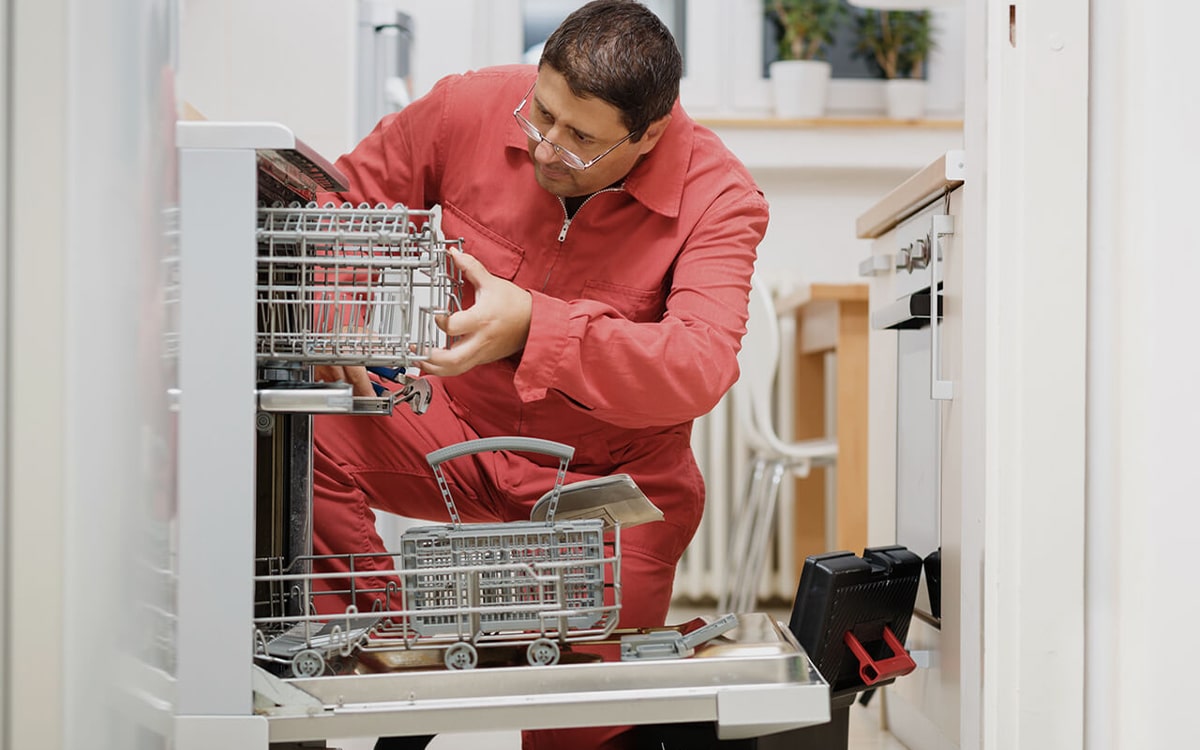Dishwasher problems can be caused by all sorts of things, but the most common culprit is faulty parts. This might get you wondering what parts usually tend to break in a dishwasher. There are a number of dishwasher parts that are vulnerable to breaking, and in this article, we’ve collected them in one place!
Today, we’re going to take a look at what usually breaks in a dishwasher. So you can stay on top of the health of your dishwasher, and always be prepared to diagnose any issues it might encounter!
What Usually Tends To Break On A Dishwasher?
Drainage
Occasionally, the drainage systems of your dishwasher can be prevented from doing their job. This can result in leakage, odd smells, and even water pooling in the bottom of your dishwasher for hours at a time.
Drainage errors can be caused by a number of things. Perhaps the most common issue that affects dishwasher drains is build-ups. If your dishes aren’t sufficiently rinsed, or your dishwasher’s filter is not working properly, then food can easily gather up and stick to the linings of the dishwasher’s drains. This can slow down drainage, and in the worst cases, stop it in its tracks!
Drainage pipes can also become damaged and cracked. This can result in water leaking as the dishwasher drains.
Dishwasher drainage systems can be very easily blocked. When they do become blocked, it can be tough for water to drain from your dishwasher. It’s best to sort this issue out quickly, to prevent leaks!
If you notice that your dishwasher’s drainage is hampered in some way, we recommend contacting a plumber to sort the issue. They will be able to safely diagnose the issue and find a resolution that won’t result in water flooding your kitchen!
Detergent Dispensers
Have you ever pulled out your dishes, only to find that they lack that polished shine you usually expect? This could be because there’s an error in the detergent dispensers. Detergent dispensers are some of the earliest parts to break in a dishwasher. Small amounts of detergent and soap can easily get stuck in the dispenser compartment, cause blockages and prevent detergent from moving about.
It’s recommended to keep a close eye on the detergent dispensers every time you open your dishwasher. If you notice build-ups, just give them a quick wipe!
The detergent dispensers can also be damaged directly by hot water. If the water is too hot, then the dispenser door could become warped, and refuse to close properly. This would then result in unwashed dishes!
The Door
Problems with the main door of your dishwasher can easily result in leaks, or could even result in your dishwasher refusing to start! Dishwashers require that the doors are fully latched before the cycle can begin.
You might be surprised at how often dishwasher doors are damaged! Luckily, it’s a very easy fix! If you notice that your dishwasher door simply won’t stay shut, and the dishwasher won’t start up, then it is likely because the latch is damaged. If the latch is not shut, the dishwasher knows that water will be able to leak out.
If your dishwasher closes all the way, but you’ve found your dishwasher leaking a lot lately, this is likely because the door seals are damaged. Replacing door seals is very easy, and should be done as soon as you notice a problem with them.

The Heating Element
Most dishwashers will use the heating element not only to warm up the water but also to dry the dishes at the end of a cycle. If you’ve ever pulled out sodden and cold dishes from your dishwasher, it’s likely that the heating element is damaged!
Usually, these heating elements are incredibly durable and reliable. However, they can be damaged by overuse, and by electrical power surges. You should make sure that your dishwasher has surge protection.
Heating elements often become damaged because they are overused, and exposed to incredible temperatures. Make sure to never set your dishwasher to a temperature that is too high for the components to handle!
The Motor
Without a functioning motor, your dishwasher won’t be able to send water around the central tub to clean your dishes! Unfortunately, even these crucial components can be damaged easily.
The motor can very easily be left vulnerable to build-ups of detergent and food. When these gather around the motor, they can make it difficult for the water jets to transport water around the central tub.
You’ll notice that the motor is impacted if your dishwasher emits an annoying squeaking noise while in action.
Frequently Asked Questions
What Usually Breaks On A Dishwasher?
The parts of a dishwasher that most commonly break include the drainage systems, the doors, and the heating elements. While you can depend on these parts to do their job, if there is ever a problem with your washing machine, the blame can often be pinned on these parts becoming faulty!
Why Do Things Break In The Dishwasher?
Extremely delicate objects, such as those made of crystal, can easily be shocked and shattered due to the extreme temperatures of the water. This is why such objects should never be placed in a dishwasher. Other items can be damaged if they are simply placed too close to one another. When the dishwasher is in action, there is some amount of vibration. This vibration can cause objects to crash against one another!
Can Overloading A Dishwasher Break It?
In most cases, overloading your dishwasher will simply result in an unsatisfying and unfinished clean. In other cases, it can actually cause damage to the dishwasher itself. When there’s too little space in the dishwasher, it’s easier for temperatures to climb to dangerous levels. This can cause many dishwasher parts to be warped!





